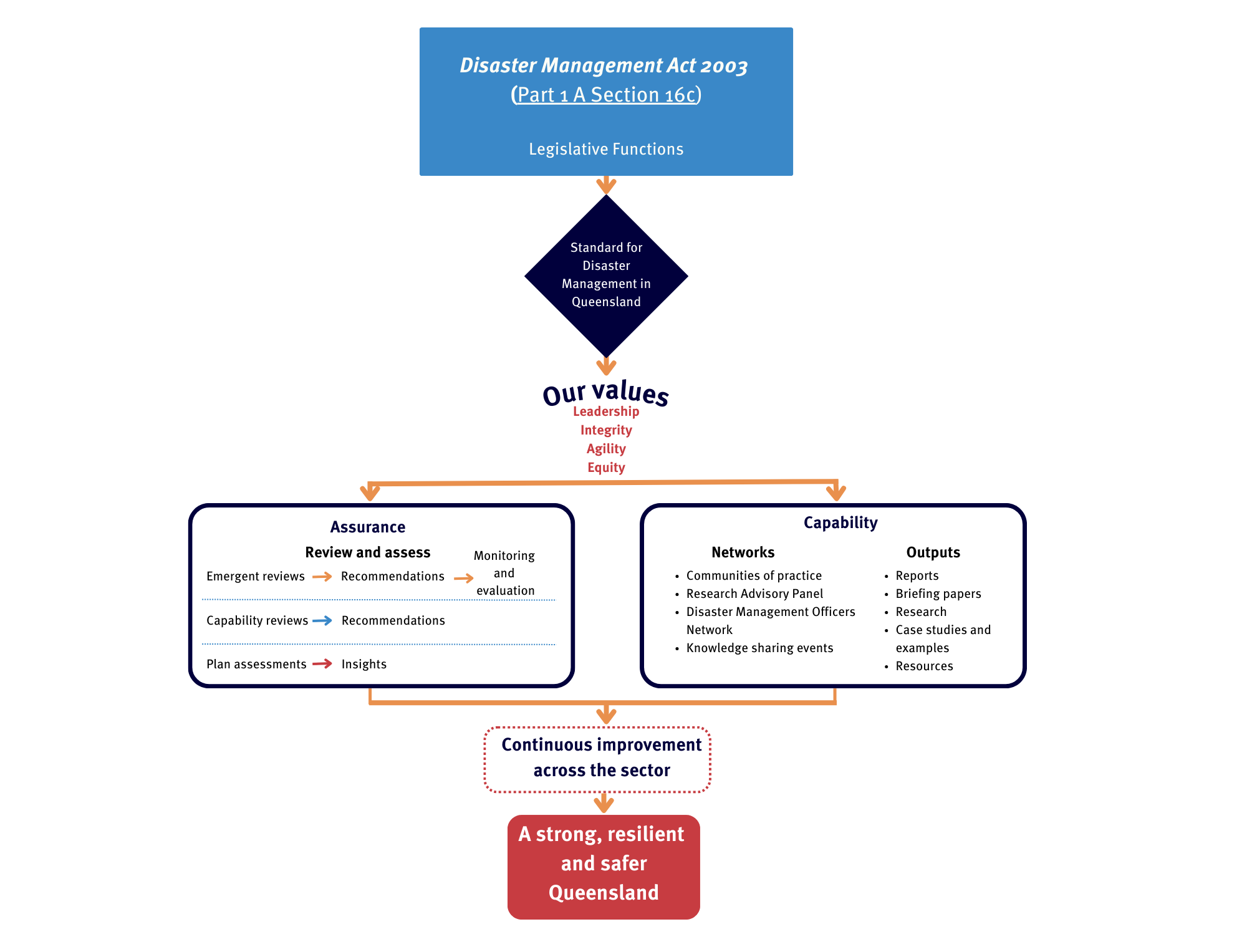The Office of the IGEM provides assurance and advice to enhance Queensland’s disaster management arrangements to ensure they remain fit for purpose and adaptable to the State’s increasingly complex environment.
Enabled under the Disaster Management Act 2003, the Office reviews and assesses the effectiveness of the State’s disaster management arrangements, builds capability within the sector and facilitates collaborative partnerships. This fosters a culture of continuous improvement and good practice.
The following diagram demonstrates how the Office of the IGEM delivers its legislated functions to help create a strong, resilient and safer Queensland:
Note: The above diagram replaces the content previously contained in the Emergency Management Assurance Framework (EMAF).
Find out more
Check for definitions
Assurance activities collectively contribute to the assessment of the overall effectiveness of disaster management in Queensland. Each assurance activity differs in the level of complexity, independence, scope, depth, and rigour, to provide insight into the performance of the sector. Environmental and horizon scanning-activities highlight areas that require further analysis and enquiry.
The Office of the IGEM’s review program, including emergent and capability reviews, enables the office to review and assess the effectiveness of Queensland disaster management arrangements. Reviews identify risks and gaps and help prioritise areas of improvement.
Emergent reviews are given to our office by the Minister for Police and Emergency Services.
Reviews involve deep enquiry and can produce observations, insights and recommendations for improvement. Recommendations are shared and tracked to guide continuous improvement and enhance the effectiveness of Queensland's disaster management arrangements.
A review report provides a comprehensive analysis of the effectiveness of a particular disaster management issue, situation or set of arrangements.
Capability reviews are identified in consultation with stakeholders and environmental scanning activities. All topics are assessed to find the best way to address an issue, with the final process chosen from a suite of assurance activities.
The Disaster Management Act 2003 (DM Act) outlines the legislative obligations and responsibilities of local governments, through their local disaster management groups, and district disaster management groups to review the effectiveness of local and district disaster management plans each year.
The Office of the IGEM coordinates the annual Disaster Management Plan Assessment (DM Plan Assessment) process to review and assess the effectiveness of local and district disaster management plans, pursuant to section 16C(b) of the DM Act. This process provides a mechanism to develop evidence-based insights regarding the strengths and opportunities for improvement of disaster management planning and plans. The DM Plan Assessment process supports effective preparedness across the disaster management sector.
Capability refers to the ability to achieve a desired effect in a specific environment/context.
Capability can continually evolve and adapt to address the needs of the disaster management sector through partnerships, the contributions of our networks and the Office of the IGEM’s outputs.
Queensland’s disaster management sector recognises the importance of lessons management for driving continuous improvement and knowledge sharing across disaster prevention, preparedness, response, and recovery.
The Australian Disaster Resilience Handbook Collection - Lessons Management, Second edition 2019 was released. This nationally recognised handbook provides comprehensive advice on lessons management including a framework a set of principles to guide the implantation of the lessons management cycle.
Continuous improvement is best achieved through the sharing of knowledge and the application of lessons management consistent with the Australian Disaster Resilience Handbook – Lessons Management.




